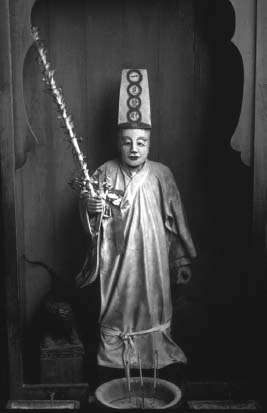Daoism and CctHolidays and Regular Observances |
Does Daoism have any annual celebrations? |
For virtually every temple community, the principal deity’s birthday provides the occasion for a major yearly festivity. Celebrants focus on the temple and the main icon, sprucing up the building and decking out the deity in new finery. In addition there are dozens of other festal days. The New Year emphasizes a fresh start, with Lao Zi’s feast on the first day and prayers to the Jade Pure One on the eighth and the Jade Emperor on the ninth day of the first month. The latter is a lengthy festivity that culminates on the fifteenth with the Lantern Festival. “Clear and Bright” falls on the first day of the third month. (In mainland China this is not lunar but occurs always on April 5.) Its main thrust is to remember the dead, maintain burial places, and offer ritual meals at the graves. Dragon Boat races on the fifth day of the fifth month commemorate the drowning of a poet of old. More important, however, is the association of that month with the need to ward off spirits of disease at a time when, with the summer solstice approaching, Yin energy begins to replace Yang as the dominant energy. CCT devotees celebrate Guan Yin’s ascension to Heaven on the nineteenth of the sixth month, during which people also mark the midpoint in the year.
On the seventh day of the seventh month, people observe the only night when the Weaving Maid and the Cowherd, a celestial couple, can be together. And the fifteenth marks the birthday of a Daoist deity called the Earth Controller, known in CCT as the emperor-sage Shun. Numerous rituals acknowledging the need to placate the wandering dead occupy many during the seventh month. Most prominent is the Ghost Festival on the fifteenth day, when people seek to propitiate the spirits by leaving food out for them. Daoist masters now officiate at the occasion, which was formerly a Buddhist observance. A mid-autumn celebration of the moon goddess’ birthday, once a harvest festival, occurs on the fifteenth of the eighth month. On the ninth day of the ninth month, called Double-Yang because of the auspicious nature of the number nine, people once sought protection in amulets and fled lowland evil by taking to the hills. Nowadays, most people simply go for walks in the cool fresh autumn air. On the fifteenth of month ten, worshippers mark the birthday of a Daoist deity called the Controller of the Waters, known in CCT as the sage Yu. A winter festivity marks the solstice during the eleventh month. Before the twelfth month is even half spent, planning begins for the New Year.

Statue of Choi Bak Sing Gwan, a deity of wealth, in a family-run CCT temple, Honolulu. Thanks to Mrs. Au for allowing the author to take photos in the temple.
